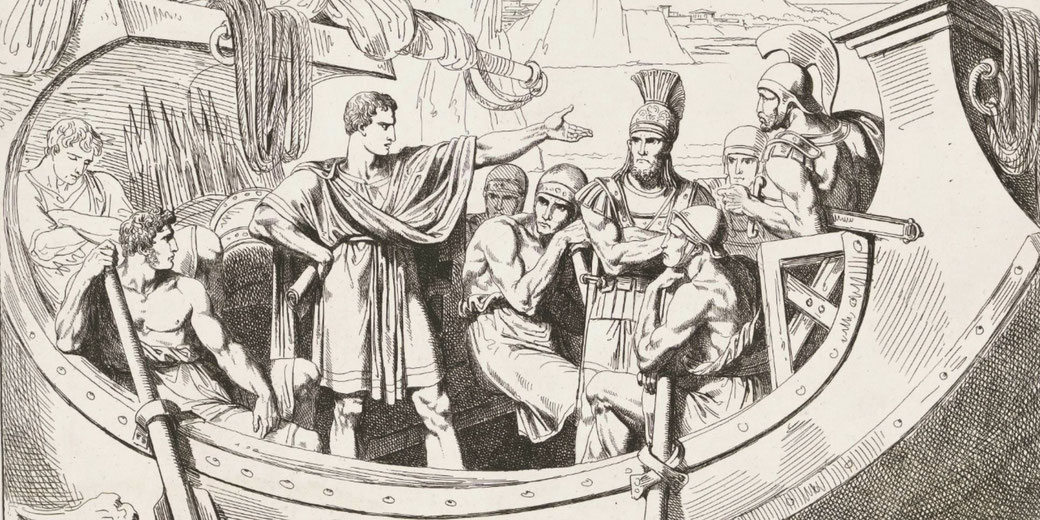The dramatic moment when Julius Caesar was captured by pirates ... and his surprising reaction

In 75 BCE, Julius Caesar sailed across the Aegean Sea on his way to Rhodes, where he intended to study rhetoric under Apollonius Molon.
At this point in his life, he had already served as a military tribune and came from a patrician family with strong political connections.
His voyage, however, ended near the island of Pharmacusa after Cilician pirates intercepted his vessel, which would become one of the most memorable episodes of his early life.
Were there pirates in Ancient Rome?
Piracy had plagued the Mediterranean consistently during the late Roman Republic, and the eastern waters near Cilicia became a well-known refuge for pirate groups that operated from hidden bases along the coast of Asia Minor.
These groups attacked merchant ships and coastal settlements with increasing tenacity.
The Roman Republic controlled vast territories by this time, but it lacked an effective and permanent naval force that could suppress piracy over such a wide area.
In particular, the pirates targeted wealthy Roman travellers and demanded large ransoms from families or local officials who either received bribes or lacked the military power to respond.
Some governors cooperated with the pirates in exchange for a share of the profits.
Roman officials ignored the growing problem until the raids disrupted grain supplies and embarrassed prominent citizens.
Piracy would not disappear until Pompey Magnus launched a naval operation in 67 BCE and drove the pirate fleets from the sea.
Capturing someone of high birth promised financial gain, since pirates viewed young Roman nobles as valuable prizes, and their release could fund future operations.
Typically, hostages remained on isolated islands or in fortified coastal camps during ransom negotiations, where they endured harsh conditions or sometimes received respectful treatment intended to encourage payment.
How Julius Caesar was captured
Caesar travelled with a modest escort toward Rhodes, and his ship passed near Pharmacusa, a small island under pirate control.
The attackers overpowered his men and brought him ashore, where they planned to demand twenty talents of silver for his release.
However, Caesar laughed at their figure and insisted they raise the price to fifty, arguing that someone of his standing deserved more.
His suggestion puzzled the pirates, but they agreed and sent messengers to nearby cities to collect the money.
Caesar remained on the island with a handful of attendants while he waited for the ransom to arrive.
He refused to act like a prisoner. He mingled with the pirates, joined their conversations, and issued commands as though he held authority.
He read his poetry and speeches aloud and became angry when the pirates failed to praise his work.
He also ordered them to keep quiet when he needed rest and treated them with a level of contempt that they tolerated, perhaps out of confusion or admiration.
Rather than beg for mercy or plan an escape, Caesar studied their behaviour and memorised their routines.
He warned them that he would return to punish them once he secured his release.
Paying the ransom
Once Caesar’s envoys returned with fifty talents of silver, the pirates released him in the belief that they would sail away unharmed.
Their error underestimated his resolve. Caesar travelled to the port city of Miletus and immediately requested a fleet from local officials.
Having learned the pirate base and its defences, he needed little time to locate and attack them.
The operation succeeded quickly and resulted in the capture of most of the men who had held him.
He brought the pirates to Pergamum and handed them over to Marcus Junius, the governor of Asia, who delayed any action while considering how best to profit from their capture.
Caesar, unwilling to wait, returned to the prison, took back the pirates, and ordered their execution by crucifixion.
To lessen their suffering, he first had their throats cut, fulfilling the promise he had made repeatedly during his captivity.
By carrying out his threat, Caesar sent a clear message that he would not forgive humiliation.
He did not wait for formal approval or concern himself with Roman legal procedure, which was a foreshadowing of his later political career.
What do you need help with?
Download ready-to-use digital learning resources
Copyright © History Skills 2014-2025.
Contact via email
With the exception of links to external sites, some historical sources and extracts from specific publications, all content on this website is copyrighted by History Skills. This content may not be copied, republished or redistributed without written permission from the website creator. Please use the Contact page to obtain relevant permission.





